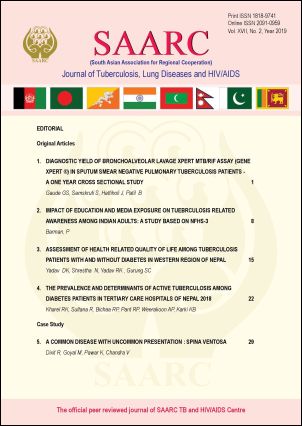Impact of Education and Media Exposure on Tuberculosis Related Awareness among Indian Adults: A Study Based on NFH-3
DOI:
https://doi.org/10.3126/saarctb.v17i2.49109Keywords:
Tuberculosis, Correct knowledge, Education, Media exposureAbstract
Introduction: Lack of awareness about a contagious disease like pulmonary tuberculosis (TB) among the general population may be a hindrance to early prevention of infection and timely care-seeking, besides being a stigma fuelling factor. The objective in this study is to identify the roles of education and media exposure on correct knowledge regarding the route of TB transmission across selected low awareness geographical regions of India, one of the 30 high TB burden countries according to the WHO.
Methods: The study is based on NFHS 3 (2005-06) unit level data on adult men and women using basic statistical tools and logistic regression analysis.
Results: Adults of both sexes in the northern, central and eastern regions of India are found to have lower than all India share of correct knowledge about the route of TB transmission. Education seems to be positively impacting correct knowledge among women in all three regions and among men, only in the East. Good exposure to mass media significantly raises the probability of correct knowledge among both genders in the east while leaving no impact in the north and central regions.
Conclusion: Adoption of a more holistic approach in fighting TB is the need of the hour. Besides addressing the medical aspect of the disease, region-specific deeper socio-economic factors like education and media exposure that can potentially impact disease related knowledge and awareness need to be incorporated in attempts to control TB particularly in a high endemic country like India.
Downloads
Downloads
Published
How to Cite
Issue
Section
License
Copyright © SAARC Tuberculosis and HIV/AIDS Centre (STAC), all rights reserved, no part of this publication may be reproduced, stored in a retrieval system or transmitted in any form or by any means without prior permission of the STAC.





